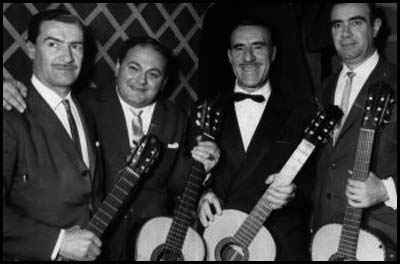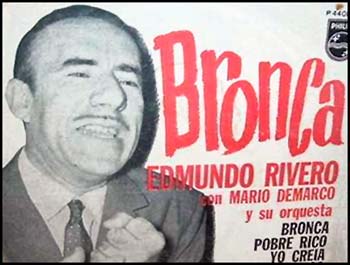By
Bronca - Crisis, military and the tango “Bronca”

his is the story of a tango inspired in one of the many crisises of Argentina, this time, a political-military event in the early sixties.
Between September 17 and 23, 1962 Buenos Aires and its surroundings experienced an authentic atmosphere of war because of a military internal friction. The population had the impression that the thing was serious this time. Two groups: Los Azules and Los Colorados fought over no less than «the salvation of the homeland».
General Juan Carlos Onganía, an ascending figure, commanding officer of the cavalry and guiding light for Los Azules had suggested removing the Secretary of War, General Octavio Cornejo Saravia, the Commander-in-Chief, General Juan Carlos Lorio and the Military Chief of Staff of the Army, General Bernardino Labayrú. This military top brass had supporters in different units, but Campo de Mayo and the Magdalena tank regiments backed Onganía.

There were combats in Plaza Constitución, Parque Chacabuco and Parque Avellaneda. There were dead and wounded people. To this fight a radio innovation was added: the infamous communiqués of the rebel sector with seductive slogans, for example: «We are willing to fight for the right of the people to vote. Will you fight to prevent the people from voting?» Or this other one: «After Batista comes Fidel Castro and dictatorship always leads to communism». This psychological action was implemented by the sociologist José Emilio Miguens and the journalist Mariano Grondona. The latter, many years later, admitted he had been mistaken and was sorry for that and so he publicly apologized for his behavior and also for his intellectual participation in the overthrow of President Arturo Illia.
The rebels were Los Azules, (blue) a color that in war games is given to your own forces, in opposition to the enemy ones which always are colorados (red). As for the civilian president José María Guido, he was increasingly fenced in by Los Colorados (with a coup tradition background) whom he supported because they, formally, held the army’s authority. But, intimately he was with Los Azules that, in fact, were the legalists and if they succeeded he would get rid of the former and would try with his friends an electoral solution somewhat open.
On September 23 Los Colorados surrendered and Onganía was appointed Commander-in-Chief. An energetic personality was appearing. He even impressed the crowd of Boca Juniors fans that at the stadium used to shout: «Melons, watermelons, Boca won’t be stopped, not even by the Onganía’s tanks».
The tanks attributed to General Onganía by the fans, in fact, were led by General Alcides López Aufranc who, together with General Alejandro Lanusse, had a decisive participation in the blue victory.
Between April and October the cost of life rose 26%, unemployment also increased and a large number of trade unions started strikes. In summer there was a great drought and the cost of life reached the 50%.
The natural consequence of the lack of democracy, among other things, once more sealed the fate of the people’s song by banning the radio and television broadcast of the tango “Bronca” in March 1963, a number which was born as an answer to this crisis, a proper testimony of the socio-economic and political reality of those days.

The author of the lyrics was Mario Battistella, a prolific songwriter that, on this occasion, looked at the sky as if asking permission to Discepolín, took his wings and wrote what, today and after the passing of time, will last beyond the events which gave rise to it. The music belongs to the singer Edmundo Rivero, who premiered it in the summer of 1962/63 in the city of Mar del Plata.
In March when the season began, LR1 Radio El Mundo informed the members of its cast that that piece had been banned. Surely, that was not a decision of the President Guido because he was a puppet of the military. Evidently, the lyrics of “Bronca” were annoying for the armed forces that were already planning more ambitious schemes concerning their role in the fate of our nation.
Despite the ban two renditions were recorded: the one by Edmundo Rivero with the Mario Demarco orchestra (1962) and the one by Osvaldo Pugliese with Alfredo Belusi on vocals (1963).
As a finale, here is a part of a stanza:
¿Qué pasa en este país,
qué pasa, mi Dios,
que nos venimos tan abajo?
¡qué tapa que nos metió
el año sesenta y dos!
(What’s happening in this country, what happens, my God
That we’re so down and out?
The year sixty-two fucked us!)
(“Bronca”, Edmundo Rivero and Mario Battistella)